Trade Insights: Three-toed Sloth

I’m Stressed Out!
Brown-throated Sloths (Bradypus variegatus) are native to South and Central America and are sometimes trafficked into T&T for sale in the harmful pet wildlife trade. They are targeted because people think they are ‘funny’ and ‘cute,’ but their sensitive nature and unusual needs make them extremely ill-suited for captivity.
© Ken-ichi Ueda
Sloths are cruelly misunderstood because they can appear ‘relaxed’ even when very stressed. They are slow-moving, their up-turned mouths look like they are ‘smiling’ even when they are unhappy. Their primary fear response is to remain still. They signal discomfort by raising their arms in the air (pictured), but humans often think of this as a friendly ‘wave’ and continue to encroach upon a suffering animal. Worse still, handling and the mere approach of a person can cause a sloth's blood pressure to rise.
These solitary animals do not like to be petted or groomed because these are not natural behaviours for them. Bathing sloths can be damaging since their fur is home to algae, fungi, and even moths, all of which are necessary to their survival. They are folivores that primarily live in and feed on Cecropia trees. Due to their arboreal nature, Sloths don’t have paws but instead have long claws for climbing, making it impossible for them to walk. When they do come down to the ground they must drag themselves uncomfortably along the floor. The average keeper is unable to provide captive Sloths with the diet and large three-dimensional spaces they need to thrive.
All their ‘quirky’ traits make sloths extremely well adapted to their natural environment, but extremely hard to care for in captivity. So remember, Don’t Buy Wild!
In T&T, Brown-throated Sloths are protected under the Conservation of Wild Life Act (CoWLA). It is illegal to keep captive or sell sloths in T&T without state-issued permits. Any person in possession of a Sloth without a permit is liable to a fine of $5000. Globally, Brown-throated Sloths are protected under Appendix II of the Convention on the International Trade of Endangered Species (CITES).
Notably, a Brown-throated Sloth along with numerous other wildlife was confiscated from an illegal wildlife collector in Moruga by Game Wardens in 2019.


